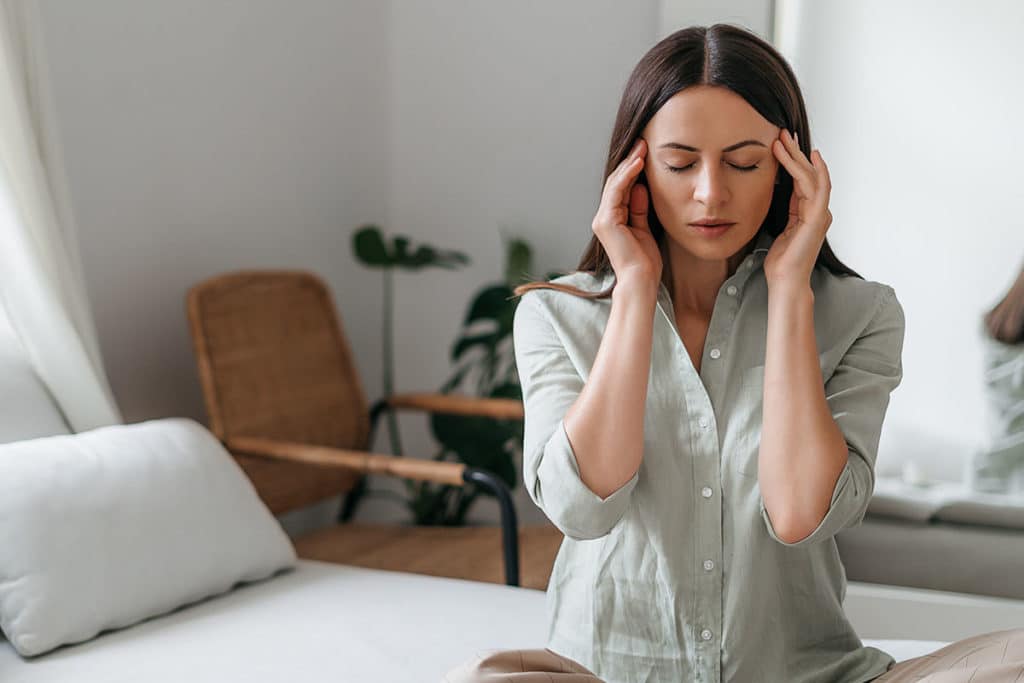Weed is a popular recreational drug. However, it’s also controversial. In some parts of the country, it’s available for medical and recreational use, while in others, it’s still illegal. Regardless of how or why you use weed, it’s possible to become dependent. A drug addiction treatment program can help you with weed withdrawal symptoms.
The Bluffs is an inpatient treatment center that offers help with all types of substance use, including dependency on marijuana. Call us at 330.919.9228 for more information on weed detox and treatment at The Bluffs.
Is Weed Addictive?
Weed can be addictive — although not on the same level as a drug like heroin. Many people who use weed claim that weed isn’t addictive at all because marijuana use doesn’t produce the same type of physical dependence that other drugs cause.
However, weed use is considered addictive because it meets many of the other criteria for an addictive substance. Individuals who use weed for a period are likely to experience:
- Increased tolerance
- Need for greater amounts and more frequent use
- Psychological dependence
- Cravings
- Withdrawal symptoms when use is stopped
The THC in weed has a powerful impact on the brain, and regular use can affect memory and concentration.
Ongoing weed use can also impact the body. Smoking can lead to respiratory issues. Weed can also cause irregular eating patterns, overeating, and insomnia.
Despite the negative effects marijuana can have, it can be hard to stop using it. This inability is a sure sign that you’ve developed a marijuana dependence.
Understanding Weed Withdrawal Symptoms
Weed withdrawal symptoms are a natural response that the body and mind go through when someone who has been using cannabis regularly decides to quit or reduce their consumption. These symptoms can vary widely among individuals and are influenced by several factors, including the frequency and quantity of cannabis use, overall health, and the presence of any co-occurring mental health conditions.
Common Weed Withdrawal Symptoms
- Irritability and Mood Swings: One of the most prevalent withdrawal symptoms is irritability, characterized by feelings of frustration, agitation, and mood swings. These emotional fluctuations can be challenging to cope with, making support and coping strategies essential.
- Sleep Disturbances: Weed withdrawal often leads to sleep disturbances, including difficulty falling asleep, staying asleep, and experiencing vivid dreams or nightmares. Insomnia can affect an individual’s overall well-being during this period.
- Anxiety and Depression: Some individuals experience heightened anxiety or even symptoms of depression when discontinuing cannabis use. These emotional challenges can be distressing, and it’s important to address them appropriately.
- Appetite Changes: Cannabis is known to increase appetite, and withdrawal may lead to reduced appetite or altered eating habits, which can impact an individual’s nutritional health.
- Cravings: Strong cravings for cannabis are a common obstacle in the journey to quitting. These cravings can persist for a variable duration after cessation.
Managing Weed Withdrawal Symptoms
- Seeking Support: Reaching out to friends, family, or a therapist can provide much-needed emotional support and a platform for sharing experiences. It can be comforting to know you’re not alone in dealing with withdrawal symptoms.
- Physical Activity: Engaging in regular physical activity can help alleviate some withdrawal symptoms and improve overall mood and well-being. Exercise is a natural way to release endorphins and reduce anxiety.
- Healthy Diet: A balanced diet can assist in managing changes in appetite and digestive issues. Staying hydrated and nourished is important during the withdrawal process.
- Distraction Techniques: Pursuing activities that you enjoy can be an effective way to divert your focus from cravings and discomfort. Hobbies and interests can be powerful distractions during this time.
- Gradual Reduction: For some individuals, gradually reducing cannabis use before quitting entirely can be a more manageable approach. This can help the body and mind adjust more smoothly.
- Professional Help: If withdrawal symptoms are severe or persist for an extended period, seeking guidance from a healthcare professional or addiction specialist is highly recommended. They can provide tailored support and treatment options.
Common Marijuana Withdrawal Symptoms
If you’ve developed a weed dependence, you’ll likely experience some of the common marijuana withdrawal symptoms when you try to stop using. These can include:
- Chills
- Headaches
- Sweating
- Fever
- Stomach pain
- Trouble sleeping
- Appetite changes
- Shakiness
Suddenly depriving the body and brain of the THC it is accustomed to can be shocking, leading to the types of effects listed above.
Psychological cravings for marijuana can produce weed withdrawal symptoms that include:
- Stress
- Anxiety
- Depression
- Irritability
- Anger
- Aggression
- Mood swings
- Restlessness
- Severe cravings
Many people use weed because they believe it brings a form of psychological relief. It’s common to hear claims that weed helps with relaxation. People who associate weed use with these effects can experience a heavy psychological toll when use is stopped.
How Treatment Can Help Marijuana Abuse
Long-term use of any substance, including weed, results in physical and mental changes. Suddenly stopping use can bring withdrawal side effects like those listed above.
The safest way to detox from weed is with medical supervision through a marijuana detox program. In addition to monitoring health and helping to alleviate withdrawal symptoms, detoxing at a rehab gives you access to addiction professionals.
Because marijuana can be very difficult to stop using, a detox patient is often advised to complete a treatment program at a rehab. A treatment program provides support for patients experiencing cravings and also identifies and treats any co-occurring conditions that have led to weed use.
It’s common for individuals to use weed as a way to self-medicate for conditions like anxiety, depression, ADHD, and bipolar disorder. Detoxing at a rehab connects you to the resources that can provide healing for any mental health concerns you’re dealing with.
Facing Weed Withdrawal Symptoms? Detox at The Bluffs Addiction Campuses
Weed may not be viewed as a “hard drug,” but there are significant benefits to undergoing weed detox at a professional treatment center.
The Bluffs offers detox and inpatient treatment for marijuana dependence. Our treatment team helps you through the detox process and then offers the tools and insights that can help you to maintain long-term recovery from marijuana dependence.
Call 330.919.9228 today for more information on marijuana detox and treatment at The Bluffs.








